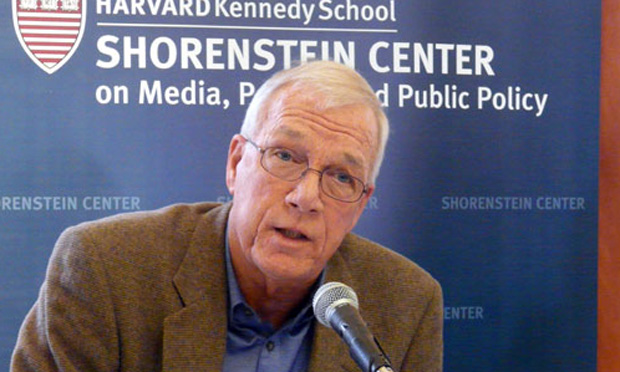Walter V. Robinson, editor at large for The Boston Globe, offered his thoughts on the future of investigative journalism during a talk he gave at Harvard Kennedy School about his newspaper’s coverage of sexual abuse in the Catholic Church and the movie that is based on the investigation. An audio file of the taped conversation is offered through Harvard’s Shorenstein Center on Media, Politics and Public Policy.
Robinson, who’s played by actor Michael Keaton in the Oscar-nominated film “Spotlight,” said it was a “small miracle” the movie was ever made. “None of us thought how we made the sausage was interesting at all,” he said, describing the tediousness of the news gathering process. But in 2003, he was asked to write an article for Nieman Reports magazine about the making of the investigation. Later, Columbia University published a case study about it. The writer of the case study was introduced to some film producers, who showed an interest in the story. After a year, Anonymous Content, a production and management company, put up money for the development of a screenplay. But the production stalled without the commitment of additional financing or actors. Then actors Mark Ruffalo, Rachel McAdams and Keaton read the script and agreed to sign on — at which point Participant Media, an entertainment media company, offered a modest budget to produce the film. “The actors loved the film so much they all worked for whatever the industry minimum is,” Robinson said.
Robinson discussed the evolution of the Catholic Church investigation by the Globe‘s investigative team, known as the Spotlight Team. “We were asked to do an investigation on one priest by Marty Baron,” said Robinson. “I confess that our reaction was more out of fear of a new boss than any conviction that there was a story we could get. The four of us called everybody we could think of … and because we put so many feelers out, we very quickly discovered that it wasn’t just one priest, that there were 12 or 15, and from that point the number kept growing as we investigated.”
Robinson said that the Catholic Church, in addition to blatantly covering up the sexual abuse committed by its priests and downplaying the rate of abuse when cases were discovered, also “played off … the blind faith that many of us had growing up Catholic.” People in Boston — everyone from individuals who knew something may have been amiss in their own parishes to the government — had too much deference to the church, said Robinson. “It’s a lesson for all of us. The institutions that we hold in highest regard … particularly those that presume great moral authority, we need to hold them as accountable as we do political institutions.”
Robinson also reflected on how the Catholic Church investigation affected subsequent reporting by the Spotlight Team. “We began to look more for stories about victimized populations, people who had no power, who were voiceless, who were being run over by society,” he said. “Most of us are so preoccupied with our daily lives, we walk by great injustices right in front of us and we don’t often stop and ask why.”
Unfortunately, investigative reporting is threatened in many cities, said Robinson. Although the Globe has partnered with Participant Media and other funders to offer a new investigative reporting fellowship, many local newspapers will no longer invest the time and resources required for stories that can take months of reporting, said Robinson.
“The prevailing view among editors is ‘Investigative reporting is a luxury we can no longer afford’ … The fact is, investigative reporting is a necessity that we cannot afford to do without,” he said. Robinson said that in the face of declining revenue in the past decade, cutting investigative reporting was a “fundamental mistake.” Readers almost always rank investigative reporting highly in surveys, said Robinson.
“The amount of investigative reporting being done now in most cities is a small fraction of what it was in the year 2000,” he said. “In many communities, even City Hall doesn’t get covered. So the whistleblower who knows about official corruption in City Hall has no one to go to … that’s a really serious problem for our democracy right now.”
During the question-and-answer session, Robinson also discussed which details of “Spotlight” are the most accurate and which facts were altered by the film’s creative team.


Expert Commentary